I was recently asked to write a short article about the word ‘solidarity’. Writing about solidarity with Nicaragua would have been easy until April this year. The narrative in brief would have been – ‘we foreigners came in the 80’s and supported the revolution, we picked coffee or planted trees, we loved the Nicaraguan people…. since then Daniel Ortega and the FSLN have generally done good work, reduced poverty, resisted the USA. We’re proud of our involvement…job done… Que viva el frente!’
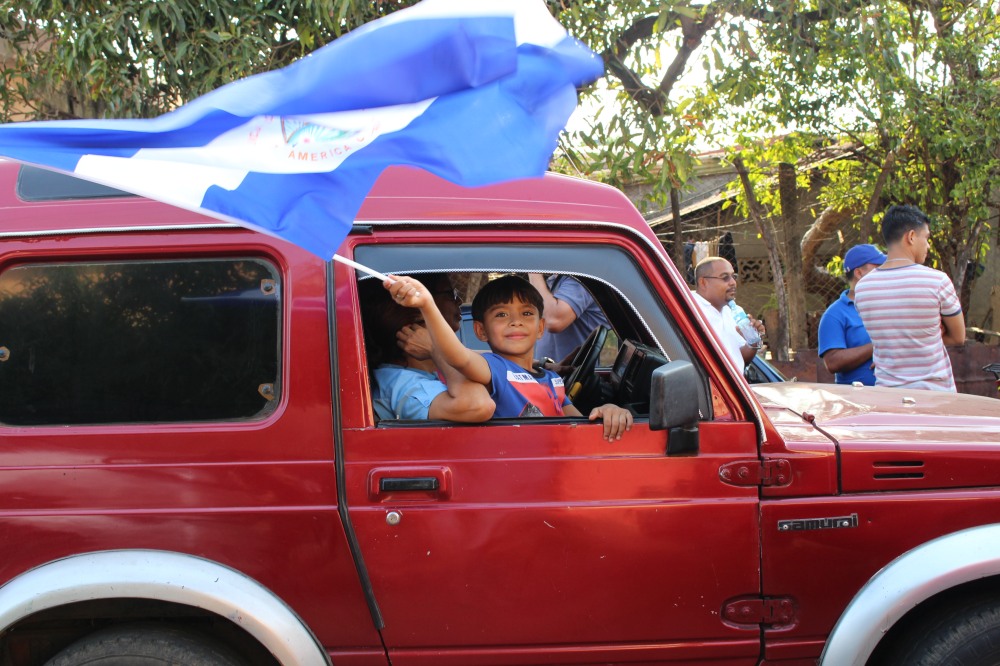
But now, writing in May 2018 nothing is as clear. For the last two years, whilst I have lived in Nicaragua, this has been a calm and peaceful country. Now no longer. Protests against economic reforms to pensions on April 18, by pensioners and students, became violent. The police turned inexplicably to live ammunition, and protesters were attacked by ‘mobs’ known as the Sandinista Youth. Across the country between April 18 and 22nd at least 45 demonstrators were killed, including students, workers, journalists and onlookers. At least one policeman was also killed. In Leon the office of the student union and an opposition radio station were burnt down. The violence ended, for now at least, when Ortega revoked the economic reforms, and both sides called for a National Dialogue, to be moderated by the Catholic Church.
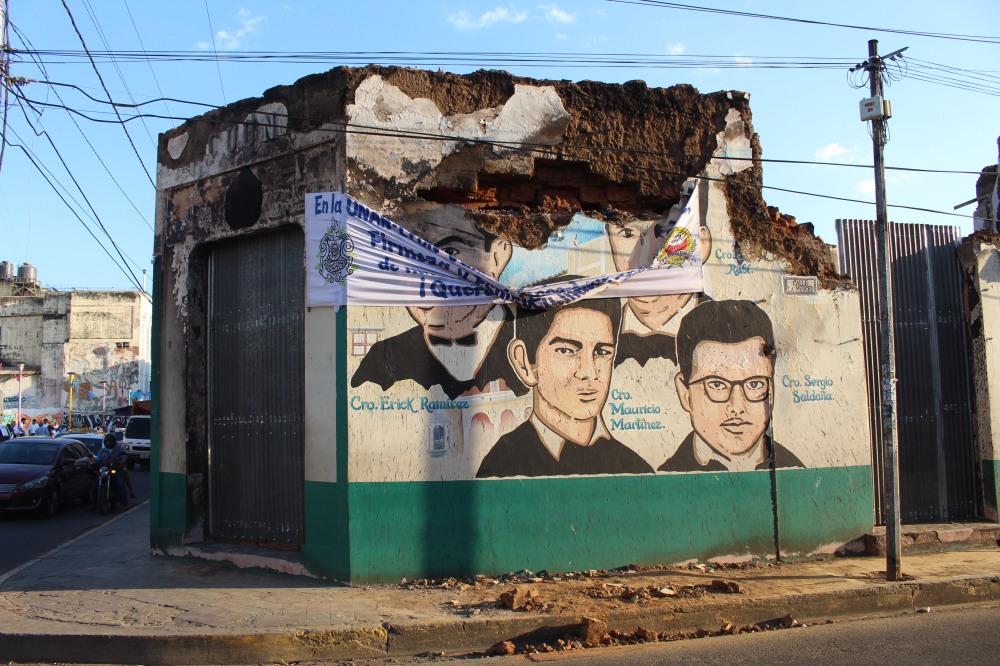
One student died in Leon on April 19th when the student union was set on fire
Since then there has been a tense calm. By the time you read this blog that may well have changed. The National Dialogue has not begun and we are seeing marches and counter-marches on the streets every day. It seems like a tinder-box that may again explode. Some people are saying the protestors have been trained, that there is covert support from the USA, that there is more to this than meets the eye. Sitting in my very hot house, in an average street, I don’t know the truth of this. I do know that most of my neighbours don’t like Ortega. But I also know that there is no credible opposition, there is no figure who could take over from Ortega, and if he goes, the gains of the revolution for the poor will be lost. So, protestors – be careful what you wish for.
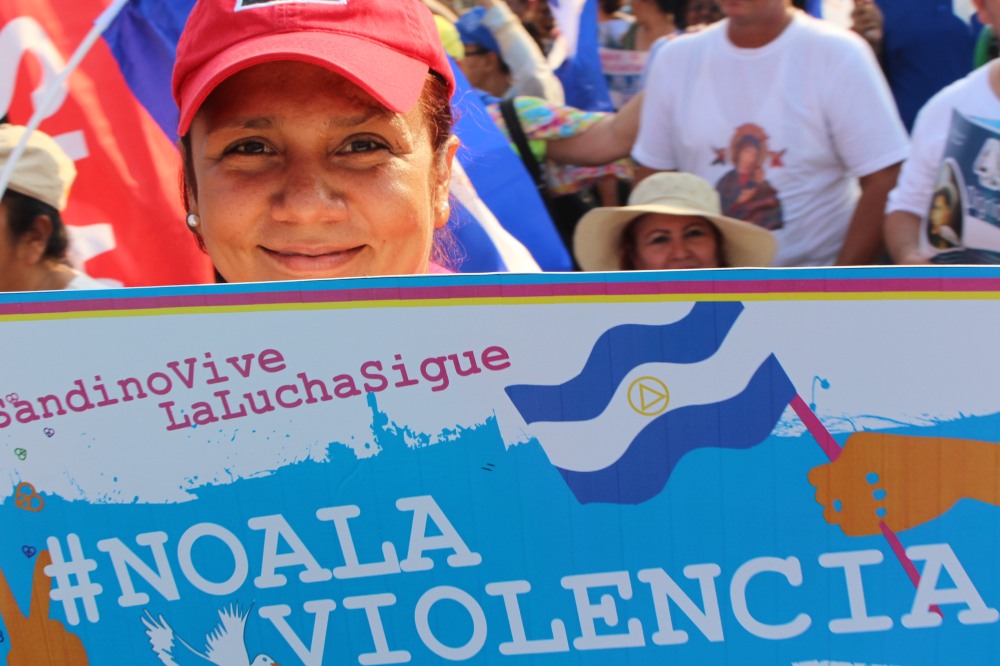
Marches and countermarches in the daytime are peaceful, both say No to Violence. But at night-time one faction or the other are burning busses and attacking the other side.
Solidarity groups, the expat community living in Nicaragua, and of course Nicaraguans themselves are now divided, angry, or disillusioned. Information is unclear, but it seems that the Ortega regime has made a major error that they may not survive. Shooting on unarmed protestors, coupled with years of low-lying criticisms (‘undemocratic, corruption, cronyism, rumored sexual abuse, creating a family dynasty, nepotism’) means Ortega’s regime may now be fatally holed, in spite of years of good progress in reducing poverty in Nicaragua.
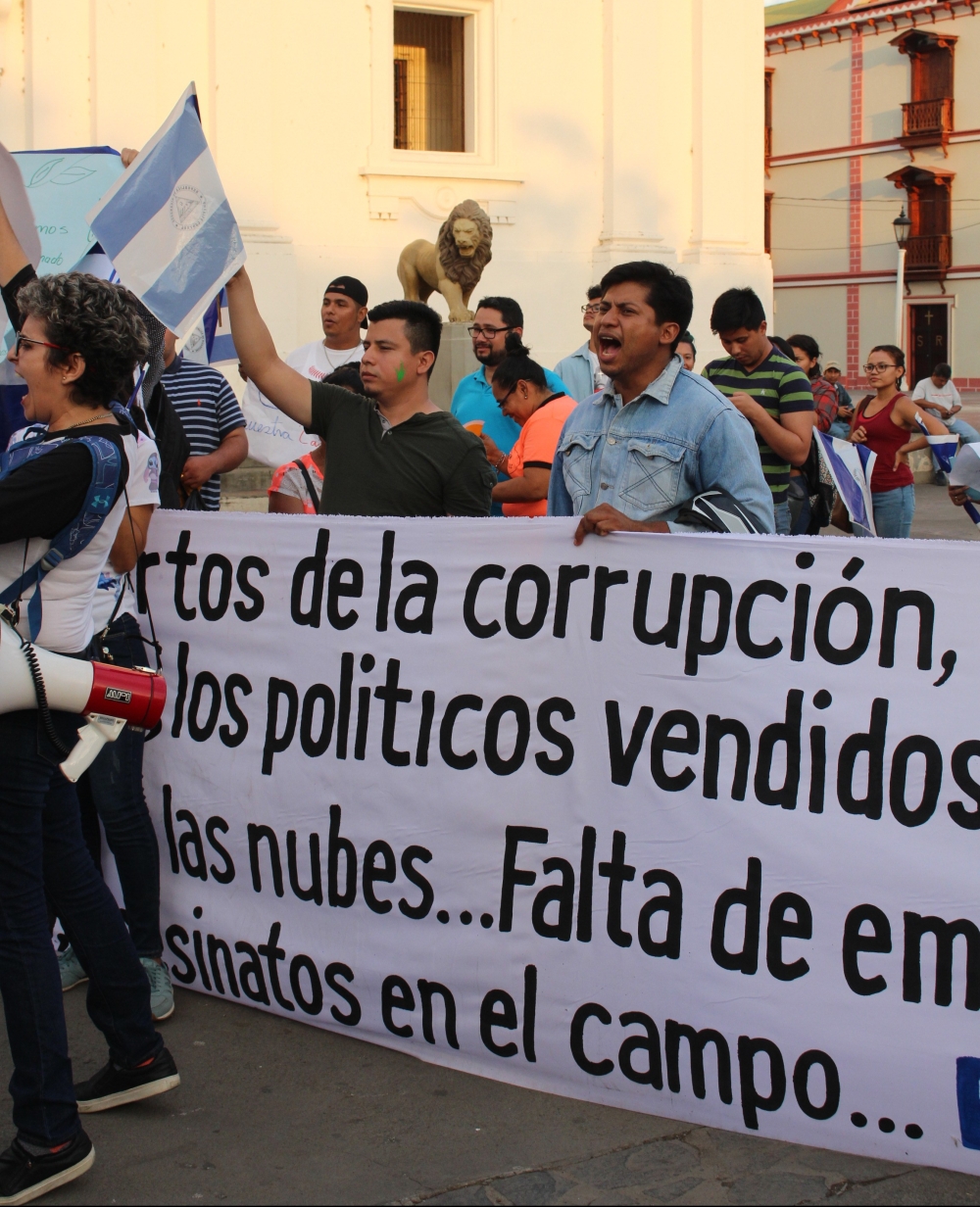
Prior to April it was a VERY rare sight in Nicaragua to see any criticism of the government
So what does the word ‘solidarity’ mean now, in the midst of this fast-changing situation? I came to Nicaragua in the 1980’s as part of the solidarity movement. Like thousands of others I was motivated by anti-USA, anti-Imperialism, and support for a small proud country trying to make its own, fairer, way in the world. (see Brigadista: An Analysis of British & US volunteers during the contra war in Nicaragua ) We were impressed by the ideals of the revolution and the progress made by the campaign against illiteracy. We picked coffee in support of the revolution and helped organize other support and campaigns. After a few decades ‘off’ I came to live in Nicaragua in January 2016. Until this month it has been politically a sleepy country.
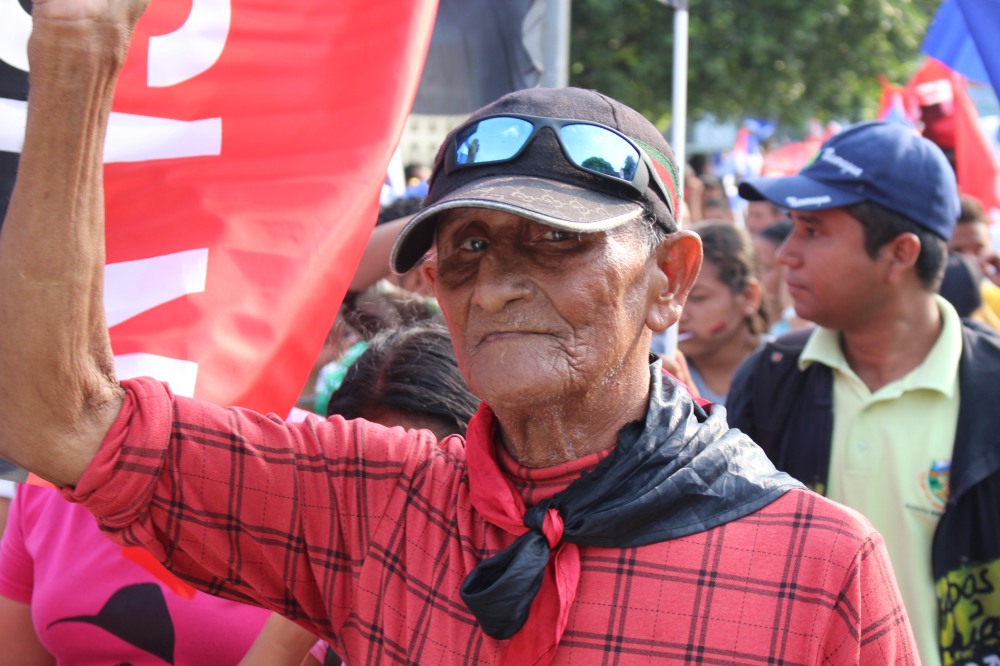
The FSLN are very well organised and effective at getting their supporters to the marches
Solidarity to me means:
- ‘Accompaniment’- living with the poor and being a friend from another country.
- Material support – working with NGOs to improve education or health or other services.
- Being a voice – Using photography, blogs, speaker tours, delegations etc to raise a voice when locally that voice is unable to be heard. For example raising the voice of deaf children in Nicaragua who have virtually no access to education.
- Advocacy in the centres of power. From campaigning against Thatcher & Reagan in the 1980’s, to today advocating against the NICA Act which is now more likely to be passed in the US senate.
Nicaragua has made vast progress since the early 1980’s. The country then had poor roads, long electricity cuts, terrible transport, limited food, inadequate schools and so on. Until last month we boasted of all the progress Nicaragua has made, under the leadership of the FSLN. By 2017 the country had excellent economic growth, a reduction in poverty, good roads, reliable electricity, improving access to public services and a burgeoning tourist industry.
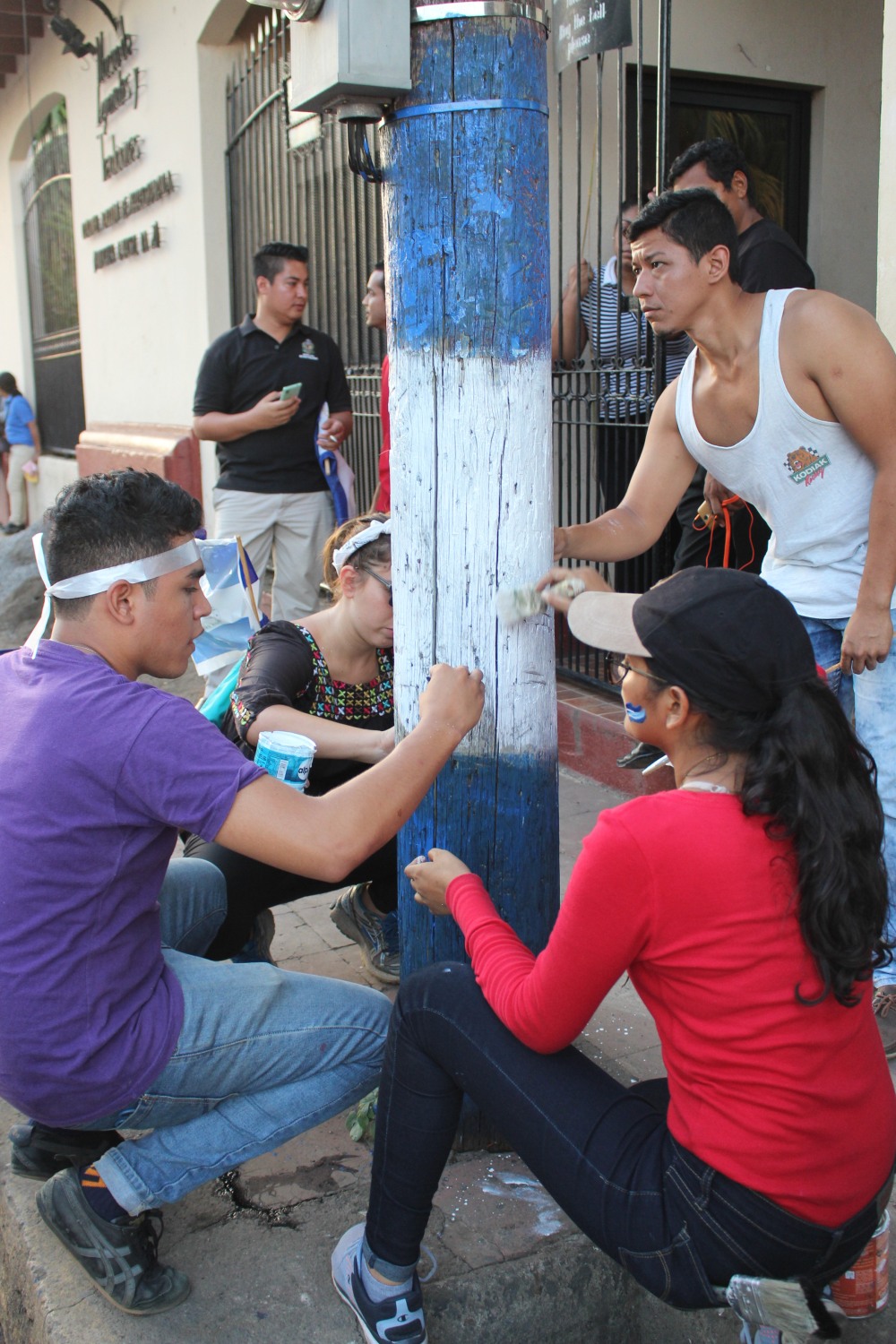
Students are painting lamp-posts in the national colours, painting over the red & black of FSLN
But, clearly the country has failed on democracy. For years we, the solidarity movement, were satisfied with economic growth and the reduction of poverty. Why did it matter if elections were a bit dodgy’ if poverty had been halved from 48% to 24%? We did not ask enough questions, we did not join demands for better electoral systems, we lost interest in the complex machinations where Ortega undermined the other political parties. It is now clear that the weakness of the opposition is a hindrance to the country, not a success. Governments need checks and balances, but the FSLN has not had them. And thus after many years of silence the population are now in the streets, and the country is on the brink of a worsening explosion.
The solidarity movement can be proud of supporting a poor country which has stood up to the might of the USA. But we failed to get the balance right as a ‘critical friend’. We have been a good friend to Nicaragua, but we failed to be sufficiently critical of the undemocratic Ortega regime.
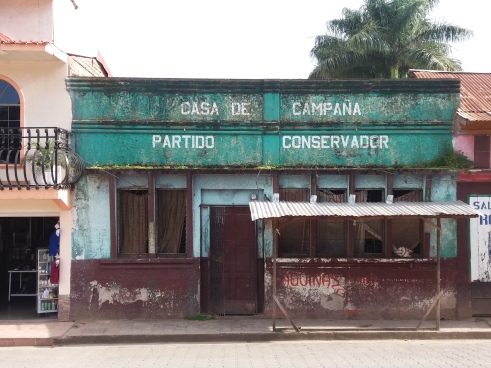
Decayed buildings & internal divisions have characterised the opposition for many years
All pictures by the author. For more photos of Nicaragua follow @owstonlewis on instagram
Feel free to add to my analysis on the Comments Tag below (please be politie). Pueden añadir comentarios abajo usando el Tag ‘Comments’
You say “solidarity” is “working with NGOs to improve education or health or other services” – as if the US government hasn’t spent over $4 million in Nicaragua since 2014 seeding many of those same NGOs (through the Reagan-era National Endowment for Democracy, which today does much of the heavy lifting the CIA used to do) with funds precisely for this current, destabilized outcome. https://www.ned.org/wp-content/themes/ned/search/grant-search.php?organizationName=®ion=&projectCountry=Nicaragua&amount=&fromDate=&toDate=&projectFocus%5B%5D=&search=&maxCount=25&orderBy=Year&start=1&sbmt=1
So, which NGO’s aren’t tainted by the NED and the imperial machinations we’re all concerned about? Seriously…
LikeLike
Its an interesting list, thanks. Why do some of the grants show the ‘Organistion Name’ and others don’t? Nicaragua has many many NGO’s, most do good work on behalf of the poor and have clean finances. Some don’t. Same as any country.
LikeLike
Thanks, Steve. Nice summary and great photos, as always. Where we may differ is around the idea that the Sandinistas were doing fine up until last month. The rapid spread of the demonstrations throughout the country suggested a generalized discontent that had been simmering for some time. The Social Security reform was only the spark. I’m sure that the US government, in its special way, has busied itself fomenting discontent with the Sandinistas, but the FSLN, itself, has been much more effective at fomenting that discontent with its long-term drift toward a corrupt and authoritarian government. NED-supported NGOs were probably involved in the demonstrations, but those people couldn’t organize what happened last month in a thousand years. That took a combination of deep discontent, the spark of the social security reform and the repressive response of the Sandinista security apparatus and our friends, the “mass” organizations.
It makes me extremely sad to say all this. I, too, went to Nicaragua in the 1980s in support of the Sandinistas. I also spent a lot of time here in the U.S. fighting policy designed to destroy the Sandinista experiment. Those policies and certainly have contributed to the decay of the Sandinista revolution. I fully agree with your definition of solidarity, but the solidarity that activated me was solidarity with the Nicaraguan people’s desire to transform their country into an example of social justice for the entire world. That solidarity expressed itself as support for the FSLN because we saw the Frente as the legitimate expression of that desire for social transformation, as did lots of Nicaraguans. For me, the FSLN has long since lost that legitimacy, and the recent events only provide tragic and dramatic proof of that loss. That is not to say that the Sandinistas have not accomplished anything. They have…a great deal, in fact.
That there is no opposition ready to assume the mantle of “legitimate expression of the aspirations of the Nicaraguan people” is a huge problem, but that vacuum is not immobilizing the Nicas, and it should not immobilize us. What does solidarity mean now? I’m not ready to say that it means active support for a very diverse and complex anti-Sandinista movement, including many unsavory people who have only their own interests in mind. But nor does solidarity mean joining those calling the recent demonstrations, “social vandalism” that must (regrettably) face la mano dura. Solidarity with Nicaragua is in for a difficult and confusing time, as is the country, itself. I hope you will continue to share your perceptions with your loyal readers…Above all, be safe!
LikeLiked by 1 person
Thank you Steve for – as usual – a very informative, thought-provoking and well-written article. And the comment above really sums up the situation for me. As someone who spent (a mere) 2 weeks in Nicaragua (thanks to Steve and Kath) in February, having not visited since the 1980s, I was so glad to see how much things had improved materially for many people – especially in the urban areas. But now I realise how little I understood about the political undercurrents and how optimistic I was that things were going fairly well politically (with only small hints that something was seriously amiss). A humbling lesson for me – not to draw any conclusions from such a ‘superficial’ current view of Nicaragua – wonderful tho’ those two weeks were.
LikeLike
Thanks, Steve, for your blog. I agree with your points. Yes. Stay safe.
LikeLike
Note that I worked as a volunteer at Cafe Luz Esteli for six months in 2014 and have since spent two to three months every year in Nicaragua on a scientific forestation proejct .
Neither side come out of these incidents well , The demonstrations were bad given that Nicaragua’s debt is rising each year so that taxes have to rise and the response illustrates the obsession with all politicians of retaining power and the world wide problems with the police. In relation to the last points Nicaragua risks going to an undemocratic extreme right government as in Honduras and, personally in England, I was attacked by police on two occasions when I was young and at least two black people were killed in Stoke Newington police station during the 13 years that I lived in the area. These illustrate the points that extremist actions and ignorant requests are a worldwide problem so nobody should specifically criticise Nicaragua.
LikeLike
We were in Nicaragua for a holiday and were struck by the gentle pleasant calm of the country, wishing we could have been posted there rather than violent Honduras. Instability quickly leads to a downward spiral of ‘tit for tat’ aggression that hollows out hope for the prosperity of the nation and erodes their people’s agency to improve their lives. Glad you are there Steve, helping to make things better.
LikeLike
The violence has continued. Police reaction to violence has been in a pattern familiar to police here in the US. There appears to be an international worsening with the tools now produced for sale and donation. However, I and an entire delegation of the Alliance for Global Justice (AFGJ) investigated and found the active, nefarious and false information work of organizations in Nicaragua funded by the US many years ago. Please check with AFGJ. I fear for the people of Nicaragua in that, as you note, their great progress may be lost. Unfortunately, it is the interest of corporate interests and believers of extreme capitalist business interests to have that happen. The NED has been active as have our State Dept, USAID, NDI, IRI (under Sen McCain) and other orgs masquerading as “democracy promotion”. What nations political party in dominance has not tried to solidify their position. Think of our US Supreme Court, our wars, our military industrial socialism or reflect on our treatment of Native Americans and other minorities. I fear the powers of the US are poised to once again take over this beautiful nation that a few sick people view as a bad example.
LikeLike